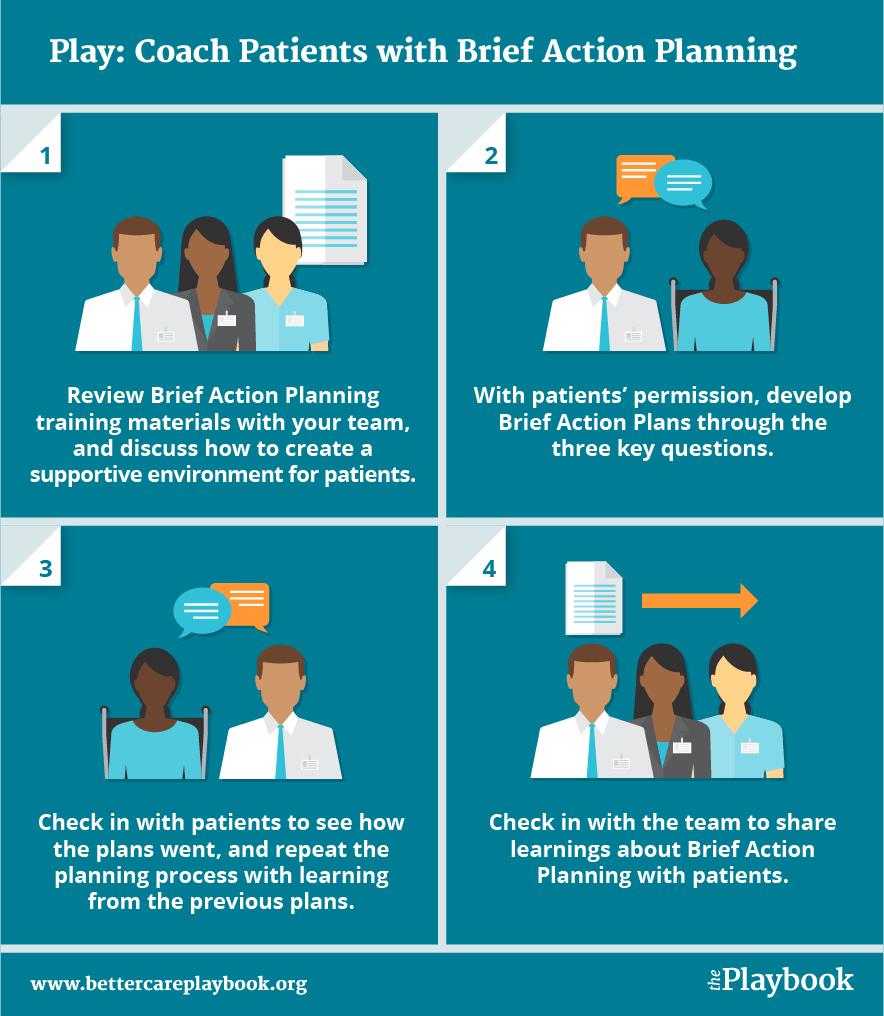Play Strategy
Many patients with complex needs are living with chronic conditions that can only be improved through self-management. Brief Action Planning is a self-management support technique developed by the Centre for Collaboration, Motivation & Innovation (CCMI). It guides providers to invite patients to set health goals and create specific, deadline-driven plans to change their health behavior, if they are interested in doing so. It may not be appropriate for all patients— for example, for people whose primary challenges are not health-related, or for patients who have mental illness or dementia.
The goal of this play is to engage patients in self-management, which may be part of your care model.


How to run the Play
- With your team, review the free training materials available from CCMI about Brief Action Planning, available below. Discuss how you will create an environment of support, respect, and acceptance for your patients, and consider which patients may be a good fit for Brief Action Planning.
- Begin making Brief Action Plans with a small number of patients. With permission from the patient, ask the three key questions in Brief Action Planning:
- “Is there anything you would like to do for your health in the next week or two?”
- “How sure do you feel about carrying out your plan?”
- “Would it be helpful to set a check on how things are going with your plan?”
- Follow up with patients about how their Brief Action Plans went, and repeat the Brief Action Planning process, taking into account what was learned from the previous plan.
- Check in with your team to assess how the Brief Action Plan is going, review any data on whether patients are improving, and iterate and scale up with your learning.
Tips and tricks
- It may not be appropriate to use Brief Action Planning in all situations and with patients who are not yet activated around health issues. At the same time, Brief Action Planning can be used to make any behavior change, so consider adapting the process to help patients make action plans related to any life goal that matters to them and has an impact on their health.
- Brief Action Planning should only be undertaken in the spirit of motivational interviewing: showing care for patients’ goals, accepting patients’ right to change or not change, partnering with patients as equals, and bringing out patients’ own ideas about how to improve. Providers should respect patients’ choices at all times, including their choice not to change.
- When patients do want to create Brief Action Plans with the help of providers, make sure to get specific with the plan. Ask “What?,” “When?,” “Where?,” and “How often?,” to get clear on what the patient plans to do.
For more information
- View a printable PDF of this Play.
- Read about Brief Action Planning and access free educational resources on the CCMI website.
- For an in-depth look at each of the three questions, read “Brief Action Planning to Facilitate Behavior Change and Support Patient Self-Management.”
- Watch a video with Connie Davis, NP, Co-Director of CCMI, about Brief Action Planning.
- If you’re looking for additional support, contact CCMI about training and certification.
- You can find more information on self-management in the Playbook’s related resource on the Health Resilience Program.


